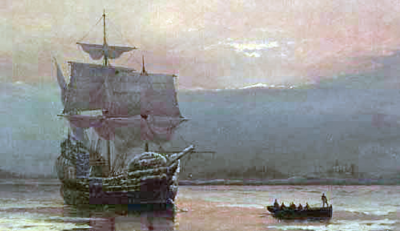The forgotten, but pivotal, Mayflower Compact

This November marks the 400th anniversary of the Pilgrims crossing the Atlantic and signing the historic Mayflower Compact.
But for many Americans today, this once well-known story barely stirs a connection with Thanksgiving — much less with America’s earliest foundations of civil and religious liberty. Compounding the problem, the pandemic of 2020 has cancelled public celebrations that would have put a spotlight on this pivotal moment in history.
So let’s take a moment now and pick up their story in the early 1600s. It was not a large geographical move that began the Pilgrim’s journey — it was an enormous step of faith.
As part of the Puritan movement in England, the Pilgrim leaders had sought to bring reforms to the Church of England inspired by the Reformation in Germany. To them, Christianity was about inward transformation of the heart, and a conscience made obedient to Christ and His Word. They were not fond, to say the least, of the English monarchs imposing their rule on the church by external force. Under these circumstances, reforms from within the Church were slow and limited.
However, in a radical and dangerous move, many Puritans began stepping out of the state church to form separate — and illegal — private congregations. Those who did so acquired the title of Separatists. The Pilgrim leaders were among them. For this they suffered much persecution in England which drove them to Holland for a period. While there, they decided on a move to the New World.
As can happen to us today, the Pilgrim’s plans took an unexpected turn. A stormy Atlantic voyage put them well north of their intended destination near modern-day New York City. When attempts to sail south were thwarted the Mayflower’s passengers and crew faced a winter in the wilderness of Cape Cod.
At this point in their story we should take heart as we consider the challenges of our time. They were blown off course. They were outside of their intended governmental jurisdiction. There were mutinous speeches and anarchy brewing on the ship. But with these problems and more, they were about to make history.
To unite and govern their diverse group, the Pilgrims drafted the Mayflower Compact — a covenant made by all aboard the ship before any set foot on land. In contrast to the monarchy escaped from in England, they brought back the idea of self-government — a concept lost since Israel asked God for a king 2600 years earlier. With acknowledgement of God as the highest authority, they would together agree to the details of their civil government, consenting to be governed by that which they had a hand in shaping.
Instead of hindering the church, the Mayflower Compact supported the freedom to live “for the glory of God, and advancement of the Christian faith.” Now, the Pilgrims not only had the internal liberty of Christ within them, they had the external liberty of favorable civil government. These ideas, reflected later in the United States Constitution, helped prepare America to have a massive role in global evangelization.
The Pilgrims succeeded in their vision of “laying good foundations…for the advance of the gospel of the kingdom of Christ in the remote parts of the world, even though they should be but stepping stones to others in the performance of so great a work.”1
The journey they were on is still not finished today. Let’s not forget them, or the stepping stones they left for us to walk on.
One opportunity to mark the 400th anniversary of the Mayflower Compact can be found at: https://2020vfa.com.
1. William Bradford, Of Plymouth Plantation.
Chris Lascelles is a missionary from New Zealand, having worked in the USA for 26 years. He is serving with Youth With A Mission in Tyler, Texas. He has written a book for the 400th anniversary of the Mayflower Compact, called 20/20 Vision for America.



























